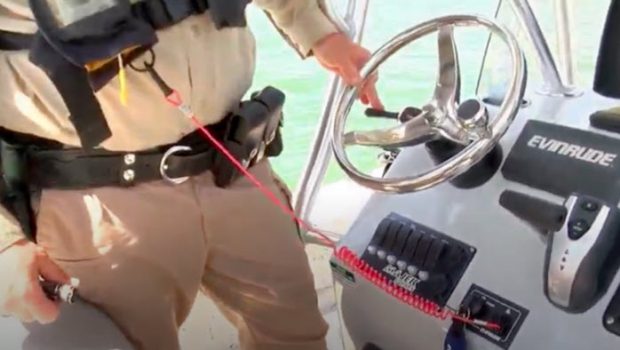Time to change our boating habits
Published on May 21st, 2022
If you are anything like me, and have never used the engine kill cord when available, Emlie Barkow Veinot wants your attention. See below… she’s got mine. – Craig Leweck, Scuttlebutt
In honor of National Safe Boating Week, it is time to take a real, honest look at wearing our Engine Cut-off Devices. This is how I see it; we are in the habit of clicking our seatbelts prior to driving a car, if not that annoying beeping makes us do it anyway. Why should driving a boat be any different?
I am a Sailing Director and have been for over 16 years at various programs all across the country. I have been searching for an Engine Cut-Off Device that reminds users to wear it and is a simple replacement of the standard Kill Cord to our fleet of 10 coach boats at Pewaukee Lake Sailing School in Pewaukee, WI.
Our coach boats consist of 10-18 feet long tiller and steering wheel whalers, or inflatables operated by 15 to 22-year-old coaches. The standard Kill Cord is too often forgotten and left to hang in the Engine Cut-Off Switch without being worn.
Recent tragic accidents, injuries, and even deaths related to a boat operator going overboard without being connected to an Engine Cut-Off Device makes for a necessary change. We must reset our mindset when it comes to operating our boats.
Much like sitting behind a wheel in a car and putting on your seatbelt, sitting behind a wheel in a boat and putting on your Engine Cut-Off Device should be standard practice, unfortunately it is not.
As of April 1, 2021 a federal law went into effect that on all navigable waters the operator of a boat with an installed Engine Cut-Off Switch (ECOS) is required to use an ECOS link. The link is typically a coiled bungee cord lanyard clipped onto the operator’s person, PFD, or clothing and the other end attached to the cut-off switch.
A new device on the market in the United States that will help us all change our habits and remind us to always clip into our Kill Cord. The LIFECORD is a ‘smart’ kill cord that knows when you’re wearing it and alarms to remind you to clip on if you are not.
Whatever it takes to use the ECOS, this needs to become the standard, the normal and a habit, much like a vehicle’s seatbelt. It could potentially save your life!









 We’ll keep your information safe.
We’ll keep your information safe.